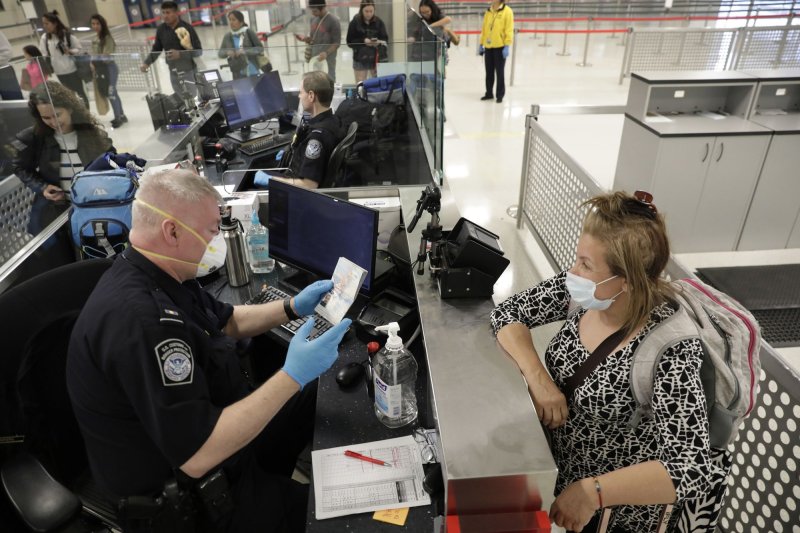Officers with U.S. Customs and Border Protection Office of Field Operations screen international passengers arriving at Dulles International Airport in Dulles, Va., on March 13. Photo by Glenn Fawcett/U.S. Customs and Border Protection/UPI |
License Photo
May 8 (UPI) -- The Trump administration failed to conduct effective screening of passengers from South Korea and Italy for the coronavirus when those countries were experiencing rapid expansion in COVID-19 cases, House investigators said.
In early March when South Korea and Italy were combating ballooning COVID-19 infections, Vice President Mike Pence announced "we are now screening 100 percent" of travelers from those countries for the coronavirus before entering the United States.
However, a report released Thursday by the committee on oversight and reform states this was not the case as the White House relied upon Italian and South Korean screeners to check passengers, of which almost none were barred from flying to the United States.
"This investigation reveals another opportunity the administration missed to limit the impact of the coronavirus," said Rep. Raja Krishnamoorthi, chairman of the subcommittee on economic and consumer policy.
According to the report, the subcommittee was briefed by staff from the Centers for Disease Control and Prevention, Customs and Border Protection, the Department of Homeland Security's Countering Weapons of Mass Destruction Office and the Department of State, which issued the screening directive for all passengers from those two countries on March 3.
The probe found that between March 3 and March 14 when President Donald Trump's sweeping travel restrictions went into effect for European nations, a total of only 13 passengers on two U.S.-bound flights from Italy were barred from boarding due to the screening process.
Similarly for South Korea, only 56 passengers were denied flying to the United States during this period.
Those who did enter the United States from Italy and South Korea, however, did not receive health screenings at U.S. airports despite the CDC issuing in late February its highest level travel advisory for those countries.
"Not until March 14, 2020, were travelers returning from Italy subjected to enhanced health screening, and travelers from South Korea never received enhanced health screening when arriving in the U.S.," the report said. "Prior to March 14, passengers did not even receive travel health advisory handouts with information about coronavirus and about how to self-isolate for 14 days."
The report accuses the Trump administration of having the ability to conduct the screenings it said it was performing but chose not to, stating such screenings had been performed since Jan. 17 for passengers arriving from Wuhan, China, where the virus emerged late last year, before being expanded to all passengers from the Asian nation in early February. The only passengers currently being subjected to enhanced screenings for the coronavirus are those returning from China, Iran, Britain, Ireland and the Schengen Europe region, it added.
After Trump issued the sweeping travel restrictions on March 14, the administration did not "robustly screen" for coronavirus symptoms, the probe found.
According to government data, of the 250,000 passengers entering the United States from travel-restricted countries between Jan.17 and March 29, fewer than 1,500 passengers, or 0.6 percent, were referred to the CDC for public health screenings.
Krishnamoorthi launched the probe mid-March after the committee received letters from five U.S. citizens who had recently returned from either Italy or South Korea and raised concerns about the screening process after they were allowed to enter the country without being checked.
"Due to denials and delays, the administration lost critical time it could have used to prepare and build up capacity to mitigate -- a capacity we are no struggling to build while the virus wreaks havoc in our hospitals and homes," Krishnamoorthi said.















